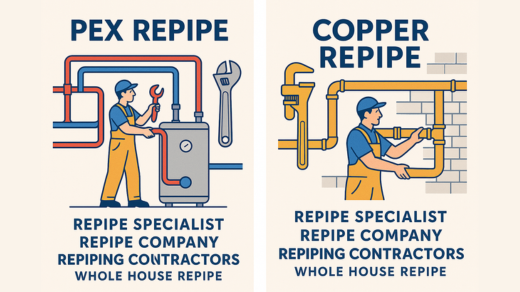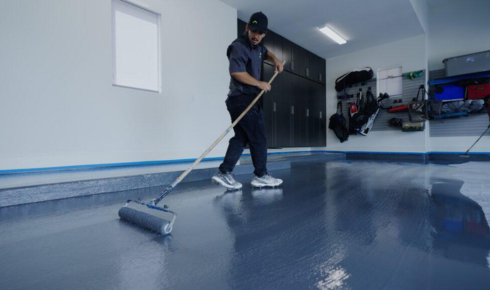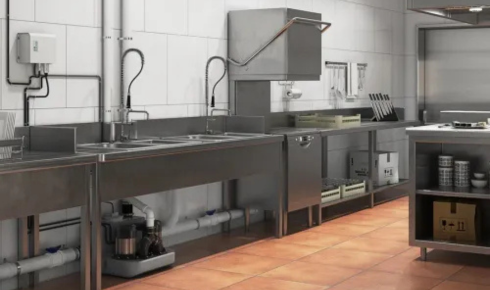When it comes to maintaining a home, few things are more important than a properly functioning plumbing system. Over time, pipes can corrode, leak, or become outdated, leading homeowners to consider repiping their property. Whether you’re experiencing low water pressure, frequent leaks, or discolored water, a whole house repipe might be the solution you need.
In this blog, we’ll break down the essentials of repiping, including the differences between pex repipe and copper repipe, how to choose a repipe specialist, and what to look for in a reliable repipe company or contractor.
What Is a Whole House Repipe?
A whole house repipe is a complete replacement of all the water supply pipes in a home. It’s a significant project but one that can drastically improve water pressure, eliminate leaks, and ensure clean, safe water. If your house is older (built before the 1970s), chances are your plumbing might still use galvanized steel pipes or other outdated materials that are prone to rust and corrosion.
Repiping your home not only resolves current plumbing problems but also prevents future ones, saving you money on recurring repair bills and potential water damage.
Understanding PEX vs. Copper Pipes
When repiping your home, one of the first decisions you’ll face is choosing the type of piping material. The two most common options are PEX repipe and copper repipe, each with its own benefits.
PEX (cross-linked polyethylene) is a flexible, plastic tubing that has become increasingly popular in residential plumbing. It’s easy to install, cost-effective, and resistant to corrosion and scale buildup. Due to its flexibility, PEX can be routed through walls and around corners with minimal cutting or disruption to your home’s structure.
On the other hand, copper is a time-tested material known for its durability and longevity. A copper repipe offers excellent resistance to bacteria and UV rays, making it ideal for both indoor and outdoor applications. While more expensive than PEX, copper adds value to your home and is often preferred in homes where water quality and temperature regulation are top concerns.
Why Hire a Repipe Specialist?
Repiping is not your average plumbing job—it’s complex, time-consuming, and requires a high level of skill. That’s why hiring a repipe specialist is crucial. These professionals focus exclusively on repiping and bring a depth of experience that general plumbers may not have.
A repipe specialist can assess your home’s plumbing system, recommend the best piping material, and complete the job efficiently with minimal disruption. They understand how to handle unique layouts, avoid code violations, and ensure a clean and safe installation.
Choosing the Right Repipe Company
Finding a reputable repipe company can make all the difference in your experience. A good company will have a proven track record, positive customer reviews, proper licensing, and warranties to back up their work.
When researching companies, look for the following:
- Experience: How long have they been in business? Do they specialize in residential repiping?
- Customer Testimonials: What do past clients say about their service?
- Warranty: Do they offer a labor and materials warranty?
- Transparency: Are they clear about pricing and timelines?
Getting multiple quotes can also help you gauge a fair price for the project. Avoid companies that offer significantly lower bids than others—they may cut corners or use substandard materials.
Working with Repiping Contractors
While some homeowners work with a full-service company, others hire independent repiping contractors. This approach can be more budget-friendly, especially if you have some of the prep work completed or prefer a more hands-on role.
However, hiring a contractor requires careful vetting. Make sure they are licensed, insured, and experienced in full-house repiping. Ask for references, and don’t be afraid to request photos of past projects or a detailed plan before committing.
Repiping contractors can also help you decide between PEX and copper based on your home’s layout, budget, and long-term goals.
Signs You Might Need a Repipe
If you’re not sure whether you need a whole house repipe, look out for these common signs:
- Rusty or discolored water
- Low water pressure
- Recurring leaks
- Water with an odd taste or smell
- Frequent plumbing repairs
Even if you’re not experiencing all these issues, having an aging plumbing system might be reason enough to consider a repipe. It’s an investment that protects your home and enhances its value.
Final Thoughts
Repiping your home might seem like a daunting project, but with the right guidance and professionals by your side, it can be a smooth and worthwhile process. Whether you choose the flexibility of a PEX repipe, the durability of a copper repipe, or the expertise of a repipe specialist, the goal is the same: safe, reliable, and long-lasting plumbing.
Don’t wait until you’re facing major water damage—act early, consult a trusted repiping contractor or company, and give your home the strong plumbing system it deserves.




